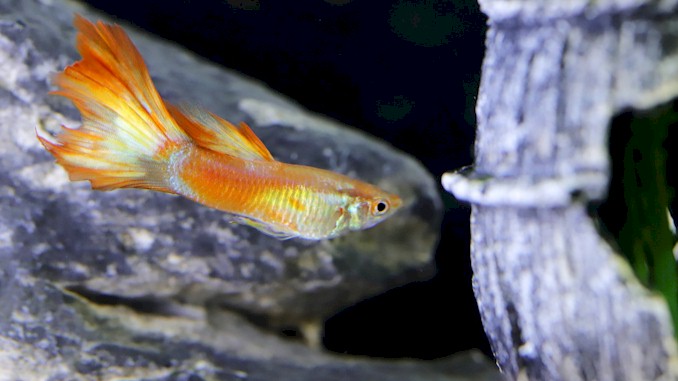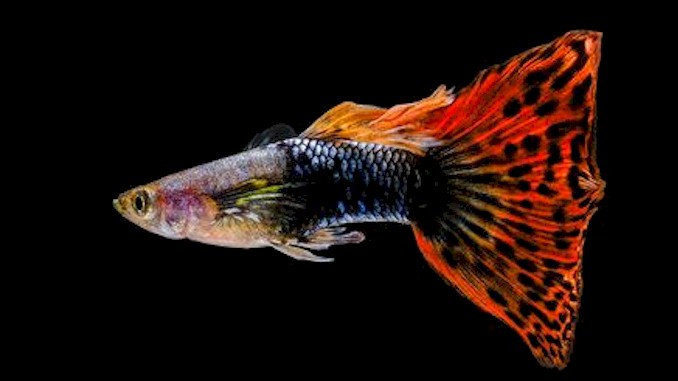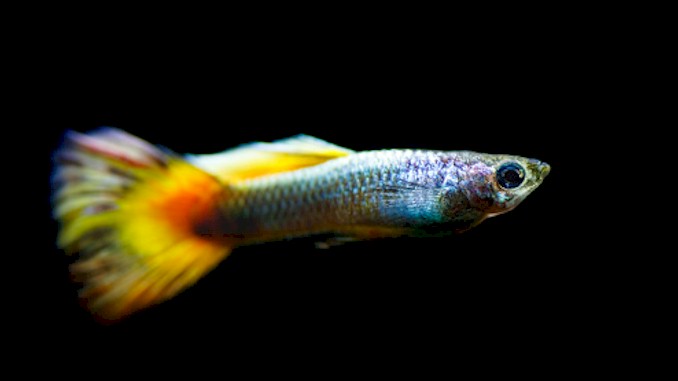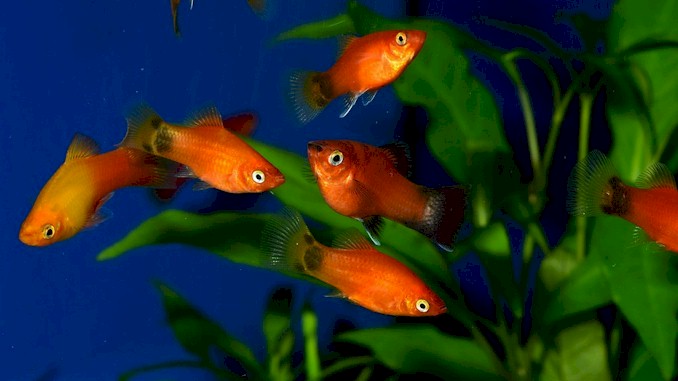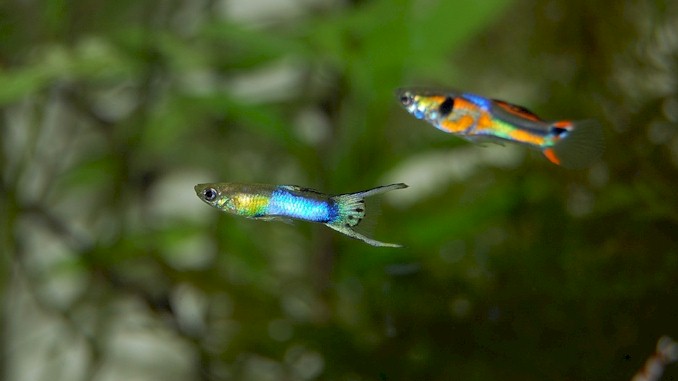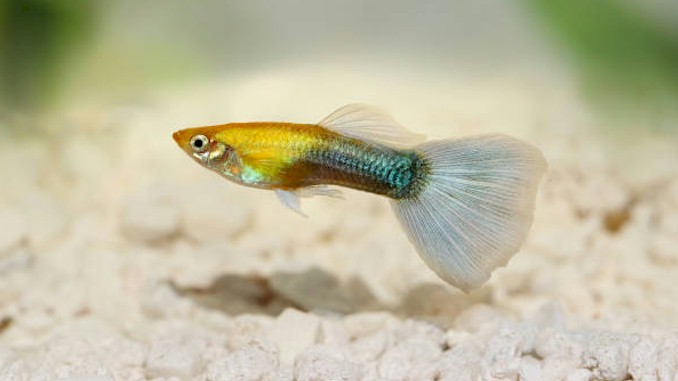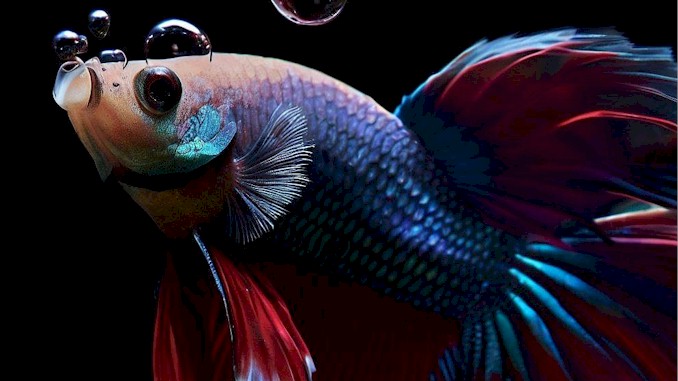What Fish Will Eat Guppies – A Complete Guide
I was on the hunt for the perfect fish to keep my guppies company, but I knew some fish can be real bullies. To make sure my guppies wouldn’t end up as someone’s dinner, I did my research. Here’s what I found out about fish that might gobble up my little swimmers, so you can steer clear of them too!
The main fish that eat guppies are large, aggressive and carnivorous fish such as angelfish, cichlids, oscars, crayfish, red-tiger sharks, barbs and leopard bush fish. These fish can prey on adult guppies as well as guppy fry. Guppy fry are also eaten by bettas, gouramis, platies, dwarf pufferfish and swordtails.
Now that you know what fish eat guppies, you might be wondering how to prevent your guppies from becoming fish food. There are some ways to protect your guppies from predators and ensure their survival in your aquarium. In the next sections, I will share with you some tips and tricks on how to choose compatible tank mates for your guppies, how to provide hiding places and plants for your guppies and how to breed your guppies safely. Don’t miss this valuable information and keep reading!
What Fish Eat Guppies and Why?
Guppies are friendly and usually get along well with other freshwater fish. They don’t usually attack other fish themselves, but because they are small, they can be easily attacked by other fish.
The biggest problem fish keepers face in a community tank is cannibalism. Carnivorous fish, which eat meat or other fish, often see their smaller tank mates as food. This means that many fish species will eat guppies.
Here are some of the most common aquarium fish that will eat guppies:
1. Angelfish


Angelfish are popular among aquarists for their attractive colors and beautiful fins. However, they can also be territorial and aggressive towards smaller fish. Angelfish can grow up to 6 inches long, which means they can easily swallow a guppy whole. Angelfish also have a strong hunting instinct and will chase any moving object in their tank.
Angelfish and guppies are two fish that are often kept together in an aquarium. However, it’s best to keep them together only when the angelfish is small. A small angelfish will not usually attack guppies.
But, once the angelfish outgrows (grows bigger than) the adult guppies, they can be a potential threat. The fully grown angelfish may look upon tiny guppies as a food source. Then they will not hesitate to try and eat the guppies.
2. Cichlids


Cichlids are a diverse group of fish that include many species such as oscars, discus, jack dempseys and convict cichlids. Cichlids are very aggressive and quick fish that can dominate their tank mates. They have sharp teeth and powerful jaws that can crush or tear apart their prey. Cichlids also have a varied diet that includes insects, worms, crustaceans and other fish.
Some cichlids can be aggressive, but there are small dwarf cichlids that can live peacefully with guppies. Rams are a type of dwarf cichlid that see guppies as “dither fish,” which means they feel more secure when they see guppies swimming around in the open instead of hiding in the aquarium.
3. Crayfish


Crayfish are not technically fish but crustaceans that live in freshwater habitats. Crayfish are omnivorous animals that feed on plants, algae, worms, snails and other aquatic creatures. Crayfish can also eat guppies if they catch them off guard or corner them in their hiding places. Crayfish have strong claws that can grab or pinch their prey before devouring them.
However, your guppies will be safe as long as they are not within the reach of crayfish.
4. Other Large Fish
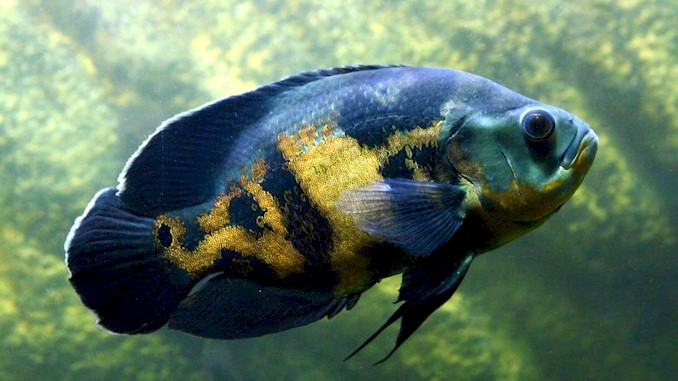

Almost any large, predatory fish can pose a threat to guppies. Some examples are red-tiger sharks, leopard bush fish, clown knife fish, goldfish and barbs. These fish have different hunting strategies but they all share a common trait: they are bigger than guppies and can easily overpower them.
These are some of the main fish that eat guppies but there may be others depending on your specific aquarium setup. The best way to avoid losing your guppies to predators is to choose compatible tank mates for them or provide adequate protection for them. I will discuss these topics in more detail later on in this blog post.
What Fish Eat Guppy Fry and How to Protect Them?
Guppy babies, also known as fry, are extremely small and can be easily preyed upon by predator fish. If you want your guppy fry to survive, you can separate them from the adult guppies and other fish or provide them with a place to hide. However, in a community tank, many fish species will eat guppy fry.
Even the adult guppies themselves can pose a threat to their own offspring! Unlike some fish species that show parental instincts, adult guppies will not hesitate to eat their own fry.
Here is a list of fish species that you should watch out for if you want to keep your guppy fry safe:
1. Angelfish


As mentioned before, angelfish are predatory fish that can easily hunt down guppy fry. Even young angelfish that have not grown fully can attack and eat guppy fry. Angelfish also have a strong preference for live food rich in proteins, which makes guppy fry an ideal snack for them.
2. Betta Fish


Bettas are another carnivorous fish that can eat guppy fry. Bettas mostly eat insects and small creatures like bloodworms, brine shrimp, mosquito larvae, daphnia and other small fish in the wild. Bettas also have long fins that can intimidate or injure guppies.
3. Gouramis
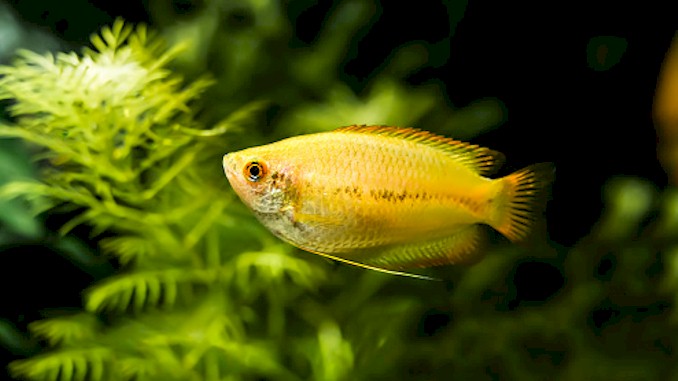

Gouramis are similar to bettas in their diet and behavior. They also eat insects and small animals as well as plants. Gouramis can be aggressive towards other fish especially during breeding season. Gouramis also have a labyrinth organ that allows them to breathe air from the surface of the water, which gives them an advantage over guppies that need more oxygenated water.
4. Swordtails


Swordtails are generally peaceful like guppies but they can also eat their own fry as well as other species’ fry. Swordtails are great for managing the fish population in community tanks but they can also reduce your guppy numbers significantly if you don’t separate them.
5. Dwarf Pufferfish
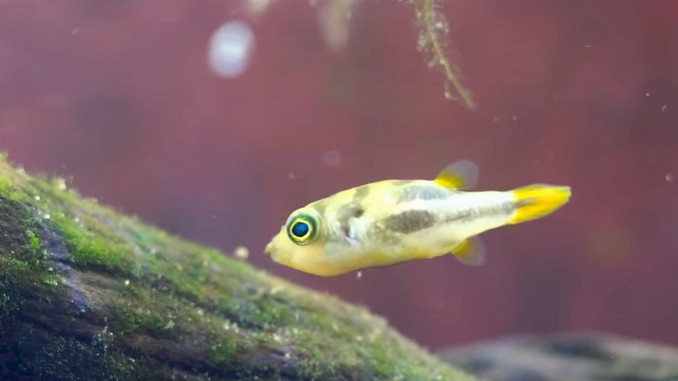

Dwarf pufferfish are very aggressive and territorial fish that can attack any fish that enters their space. Dwarf pufferfish have sharp teeth that can pierce through scales and flesh of other fish. Dwarf pufferfish also need brackish water to thrive while guppies need freshwater.
6. Platies
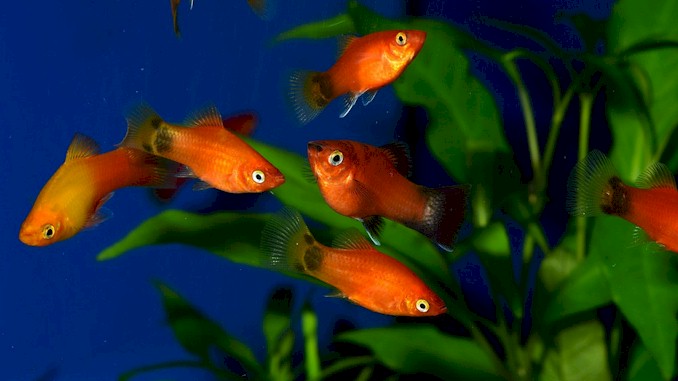

Platies are similar to swordtails in their appearance and behavior. They also eat their own fry as well as other species’ fry if given a chance . Platies are usually peaceful but they can become nippy or competitive for food with other fish.
These are some of the main fish that eat guppy fry but there may be others depending on your specific aquarium setup. The best way to protect your guppy fry from predators is to:
- Separate males and females: This will prevent unwanted breeding and overpopulation of your tank. You can use a divider or a separate tank to keep males and females apart. You should ideally have one male for every three females to avoid stress or aggression among your guppies3.
- Provide hiding places: This will give your guppy fry a chance to escape or hide from predators. You can use plants, rocks, driftwood, caves or ornaments to create hiding places for your guppy fry. You should also avoid overcrowding your tank or having too many decorations that limit swimming space for your guppies.
- Use a breeder box or net: This is a device that isolates your pregnant female guppies from the rest of the tank until they give birth. The breeder box or net has small holes that allow water flow but prevent adult fish from entering or leaving. The breeder box or net also has a compartment where the newborn fry fall into after birth where they stay safe until they grow bigger.
What Fish Eat Guppy Tails and How to Treat Them?
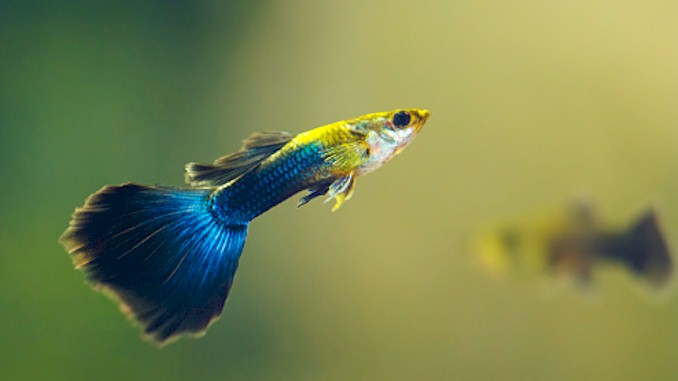

Guppy tails are one of the most attractive features of guppies. They come in various shapes, colors, and patterns that make them stand out in any aquarium. However, guppy tails are also vulnerable to being bitten or eaten by other fish. In this section, I will explain what fish eat guppy tails and how you can treat them if they get injured.
Some of the most common fish that eat guppy tails are:
- Angelfish: As mentioned before, angelfish are predatory fish that can easily hunt down guppies. Angelfish have large mouths that can swallow a guppy whole or tear off its tail with one bite. Angelfish also tend to nip at the fins of other fish for fun or dominance.
- Cichlids: Cichlids are a diverse group of fish that include oscars, blue acara, jumping guabine and many others. Cichlids are aggressive and territorial fish that can attack any fish that invades their space or competes for food. Cichlids have strong jaws and teeth that can rip off guppy tails easily.
- Barbs: Barbs are schooling fish that include tiger barbs, rosy barbs, cherry barbs and others. Barbs are usually peaceful but they can become nippy or finicky when kept in small groups or with slow-moving fish like guppies. Barbs have small but sharp teeth that can nibble on guppy tails constantly.
- Goldfish: Goldfish are popular aquarium fish but they are not compatible with guppies. Goldfish are cold-water fish while guppies are tropical fish. Goldfish also grow much larger than guppies and can eat them as snacks. Goldfish also have a tendency to nip at the fins of other fish out of curiosity or boredom.
These are some of the main fish that eat guppy tails but there may be others depending on your specific aquarium setup. The best way to treat your guppy tails if they get bitten or eaten is to:
- Isolate the injured guppies: This will prevent further attacks from other fish and allow your guppies to heal faster. You can use a quarantine tank or a hospital tank to keep your injured guppies separate from the rest of the tank until their tails grow back.
- Maintain good water quality: This will reduce the risk of infection or disease for your injured guppies. You should check your water parameters regularly and perform water changes as needed. You should also avoid overfeeding your fish or overstocking your tank as this can cause ammonia spikes or oxygen depletion.
- Use medication if needed: This will help your injured guppies recover from any bacterial or fungal infections that may affect their wounds. You can use products like Melafix, Pimafix, Furan-2 or API Fin & Body Cure to treat fin rot, tail rot, mouth fungus or other common ailments. Follow the instructions on the label carefully and do not overdose your tank.
How to Choose Compatible Tank Mates for Your Guppies?
Guppies are one of the most popular and easy-to-keep aquarium fish. They are colorful, active and peaceful fish that can brighten up any tank. However, guppies are also delicate and prone to being bullied or eaten by other fish. Therefore, choosing compatible tank mates for your guppies is very important for their health and happiness.
There are several factors that you should consider when choosing tank mates for your guppies, such as:
- Compatibility: You should choose fish that have similar water parameters, temperature and diet as your guppies. You should also avoid fish that are aggressive, territorial or predatory towards your guppies.
- Tank size: You should make sure that your tank is big enough to accommodate all the fish comfortably. You should also provide enough hiding places and plants for your guppies and their tank mates to feel safe and secure.
- Aggressiveness: You should avoid fish that are nippy or finicky towards your guppies. Some fish may nip at the fins of your guppies out of curiosity, boredom or dominance. This can cause stress, injury or infection for your guppies.
Some of the best tank mates for your guppies are:
- Corydoras catfish: These are peaceful bottom-dwelling fish that make great tank mates for guppies. They help keep the substrate clean by scavenging leftover food and waste. They also have different swimming levels and feeding habits than guppies, so they do not compete or interfere with them.
- Neon tetras: These are small, colorful fish that are compatible with guppies. They prefer similar water conditions and temperature as guppies. They also form schools and swim in the middle of the tank, adding more movement and color to your aquarium.
- Endler’s livebearers: These are closely related to guppies and make great tank mates for them. They have similar size, shape and behavior as guppies. They also come in various colors and patterns that can complement your guppy collection.
- Harlequin rasboras: These are peaceful schooling fish that get along well with guppies. They have a distinctive black triangular patch on their bodies that contrasts with their silver coloration. They swim in the upper part of the tank and add more activity and interest to your aquarium.
- Cherry shrimp: These are small crustaceans that can coexist with guppies peacefully. They help keep the tank clean by eating algae, detritus and dead plant matter. They also provide a natural food source for your guppies if they breed prolifically.
- Otocinclus catfish: These are tiny algae-eating catfish that can live harmoniously with guppies. They help control algae growth on plants, glass and decorations without harming them. They also have a gentle temperament and do not bother other fish.
- Gouramis: These are labyrinth fish that can breathe air from the surface of the water. They come in various sizes, colors and shapes that can add diversity to your tank. However, you should choose smaller species like dwarf or honey gouramis as they are more peaceful than larger ones like pearl or bluegill ones.
These are some of the best tank mates for your guppies but there may be others depending on your specific aquarium setup.
How to Provide Hiding Places and Plants for Your Guppies?
Guppies are social and active fish that like to swim around and explore their environment. However, they also need hiding places and plants for their comfort and well-being. Hiding places and plants can provide several benefits for your guppies, such as:
- Protection: Hiding places and plants can offer shelter and security for your guppies from potential predators, aggressive tank mates or stressful situations. They can also help prevent fin nipping by reducing territorial disputes among fish.
- Breeding: Hiding places and plants can create a suitable environment for your guppies to breed and spawn. They can also provide cover and food for the newborn fry that may otherwise be eaten by their parents or other fish.
- Aesthetics: Hiding places and plants can enhance the appearance and naturalness of your aquarium. They can add color, texture and variety to your tank. They can also improve the water quality by absorbing excess nutrients, producing oxygen and filtering out toxins.
There are many ways to create hiding places and plants for your guppies in your tank, such as:
- Live aquatic plants: Live aquatic plants are one of the best options for providing hiding places and plants for your guppies. They are natural, beautiful and beneficial for your aquarium ecosystem. Some of the best live aquatic plants for guppies are:
- Anubias Nana: This is a short plant with broad, dark-green leaves that grows well on rocks, driftwood or ornaments. It provides hiding places for baby guppies, helps keep the tank water clean and oxygenated.
- Guppy Grass: This is a fast-growing plant that forms dense mats of green stems and leaves. It provides excellent cover and food for guppies and their fry. It also helps control algae growth by competing with them for nutrients.
- Java Fern: This is a hardy plant with long, narrow leaves that attaches itself to rocks, driftwood or ornaments. It provides shelter and shade for guppies, especially in bright tanks. It also tolerates a wide range of water conditions.
- Aquarium rock: Aquarium rock is another option for creating hiding places for your guppies. You can use natural or artificial rocks that are smooth, clean and safe for your fish. You can arrange them in different ways to create caves, crevices or ledges where your guppies can hide or rest.
- Driftwood: Driftwood is a natural piece of wood that has been submerged in water for a long time. It adds a rustic look to your tank and provides hiding places for your guppies. You can use driftwood that has been cured or treated to prevent leaching tannins into the water.
- Aquarium ornaments: Aquarium ornaments are artificial objects that you can add to your tank to create hiding places for your guppies. You can use ornaments that are designed specifically for aquariums such as caves, tunnels, bridges or castles. You can also use other items such as terra cotta pots, PVC pipes or coconut shells as long as they are clean and safe.
What Fish Don’t Eat Guppies
Guppies are colorful and lively fish that can brighten up any aquarium. However, they are also very vulnerable to being eaten by other fish, especially their own fry. Therefore, it is important to choose compatible tank mates for your guppies that will not harm them or their offspring.
There are many factors that affect whether a fish will eat guppies or not, such as:
- Size: Larger fish tend to prey on smaller fish, so avoid keeping guppies with fish that can fit them in their mouths.
- Temperament: Aggressive or territorial fish may attack or chase guppies, causing stress or injury. Avoid keeping guppies with fish that have long fins, sharp teeth or spines.
- Diet: Carnivorous or omnivorous fish may see guppies as a source of food, especially if they are not well-fed. Avoid keeping guppies with fish that have a similar diet or prefer live food.
Some of the fish that don’t eat guppies are:
- Mollies: Mollies are peaceful and social fish that can coexist with guppies without any problems. They have similar water parameters and dietary requirements as guppies. They also come in various colors and shapes.
- Cardinal Tetras: Cardinal tetras are small and colorful fish that can add contrast and movement to your tank. They are schooling fish that prefer to stay in the middle or lower levels of the tank, leaving the upper level for the guppies. They are also peaceful and shy, and will not bother your guppies.
- Glassfish: Glassfish are transparent fish that have a unique appearance and behavior. They are schooling fish that like to swim in groups and hide among plants or rocks. They are timid and harmless, and will not eat your guppies.
- Plecos: Plecos are bottom-dwelling fish that have a sucker-like mouth and armored body. They feed on algae and detritus, keeping your tank clean and healthy. They are docile and gentle, and will not eat your guppies.
- Rasboras: Rasboras are small and slender fish that have a silver body with black markings. They are schooling fish that like to swim in large groups near the surface of the water. They are peaceful and friendly, and will not eat your guppies.

